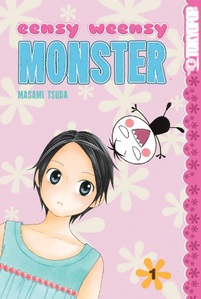Review
by Carl Kimlinger,Eensy Weensy Monster
GN 1-2
| Synopsis: |  |
||
Nanoha is tiny and cute and easily overshadowed by her brilliant, beautiful best friends. She doesn't mind. Life with Nobara, the school's female lady-killer, and Renge, the resident frosty genius, is loads of fun, and being invisible isn't bad. As teens go, Nanoha is pretty happy. Save for one little problem. Deep inside Nanoha lives a little monster. It's a vicious, sharp-tongued little thing that holds back nothing. And it comes out whenever Hazuki, the school's shallow "prince," is around. Nanoha hates the way Hazuki makes her act, so she avoids him. Until one day in the hall Hazuki makes an arrogant pass at the tiny, invisible girl and the monster comes out to play in earnest. It isn't just Hazuki who's in for a surprise, though. When Nanoha's monster shows Hazuki the truth about himself, Hazuki does the unthinkable: he sets out to change himself. And to discover the truth about the diminutive girl with the razor tongue. It's the beginning of a very odd friendship... and maybe, just maybe, something more. |
|||
| Review: | |||
Masami Tsuda wrote Eensy-Weensy Monster having just come off of twenty-plus oft-dark volumes of Kare Kano, and she claims she wanted to draw something cute and happy and carefree. And does she succeed. Eensy-Weensy Monster may just be the happiest two volumes you'll ever spend. It's twelve chapters of pure sweetness and light, sharpened by an uproarious yet insightful sense of humor and given just the right weight by its payload of gentle emotions. It's a very simple story at heart: a straightforward account of two people getting to know and like each other. But into that simple framework Tsuda works a huge variety of cuddly warmth. There's the breezy yet deeply supportive love Nobara and Renge have for Nanoha. There's Hazuki and Nanoha's warm, easygoing home lives. There's Nanoha and Hazuki themselves; their kindness, their earnest desire to better themselves, and just their basic goodness. And of course, there's Nanoha and Hazuki's relationship: a sinuous, ever-evolving thing that is always one funny development away from another fulfilling turn for the better. Angst is fine. So is psychological self-flagellation. But sometimes you just want so see two nice people fall gently in love. And that's exactly what Eensy-Weensy Monster gives us, and, miraculously, without feeling weak or dumbed-down. Sweet the series may be, but it isn't stupid. The tension between inner truth and outer appearances, the gulfs between people and the struggle to bridge them, the inevitability of change—Tsuda's dark obsessions are all in place, just turned to light, comedic and ultimately uplifting ends. The series doesn't ignore the difficulties of Nanoha and Hazuki's relationship, it just has a deep and abiding faith in the ability of honesty and affection to overcome them. And a willingness to laugh wholeheartedly (though not mean-spiritedly) at them. That adds an unassuming poignancy to the oft-hilarious progress of Nanoha and Hazuki's romance, even as it adds yet another flavor of warmth to the series' already extensive collection. Tsuda has a streak of the experimentalist in her that refuses to lie dormant even when she's being pointedly fluffy. It's there in her strict temporal structure (each chapter covers exactly one month), in her experiments with formal symmetry and her fondness for subjective viewpoints. That restless intelligence is what sets Tsuda's art apart from the shojo pack. She can draw, no doubt. Nanoha's lethal cuteness is proof enough of that. She knows the value of funny artwork (Hazuki's mental images of Nanoha, and himself, are downright deadly), and when she stretches out during Eensy-Weensy Monster's lyrical interludes, her work is flat-out beautiful. But still, her general look cleaves too closely to shojo standards, has too many complicated panel arrangements, too many big liquid eyes, look-alike boys and sparkly effects, and too few backgrounds to feel special. It is special, though. Perhaps a cursory survey of her technical skills reveals nothing striking, but the effect of her art does. The symmetrical chapters that draw structural parallels between Hazuki and Nanoha even as they enumerate the pair's differences; the repeated two-page spreads that juxtapose the pair's different perceptions of the same events; the shifts in Nanoha's design (from troll, to bunny, to woman) that communicate without a word Hazuki's shifting feelings for her: Tsuda's art adds value to her story—foreshadowing, layers of meaning, bittersweet understanding, even philosophical content—without ever overextending her artistic capabilities. Maybe she doesn't draw brilliantly, but she does draw smart. And sometimes that's better. These books are the very definition of the standard Tokyopop release: solid, dependable, no-frills. No extras, untranslated sound effects. Understated girly pink covers, sturdy construction. And a translation that draws no attention to itself. If you're the buying type, there's nothing here to stop you. Certainly the content shouldn't. Eensy-Weensy Monster is basically a four-hundred page fuzzy hug. Twenty bucks is small change to pay for that. |
| Grade: | |||
|
Overall : B+
Story : B+
Art : B
+ Short, self-contained, and makes you feel good about the world; intelligent and willing to take risks. |
|||
| discuss this in the forum (2 posts) | | |||
| Production Info: | ||
|
Full encyclopedia details about Release information about |
||